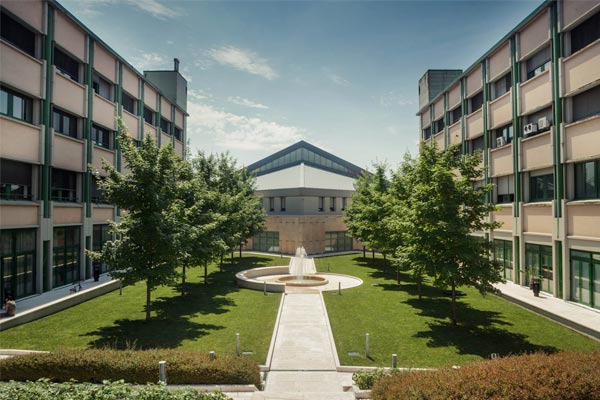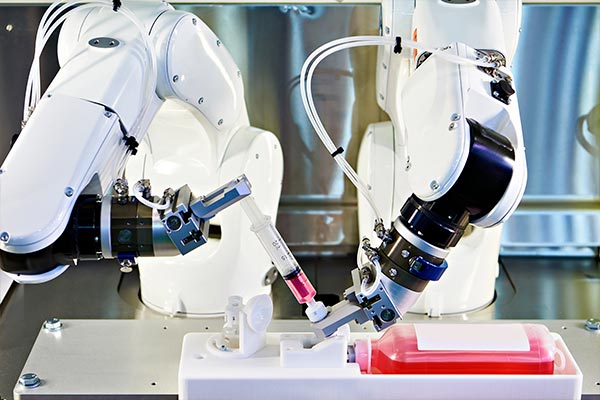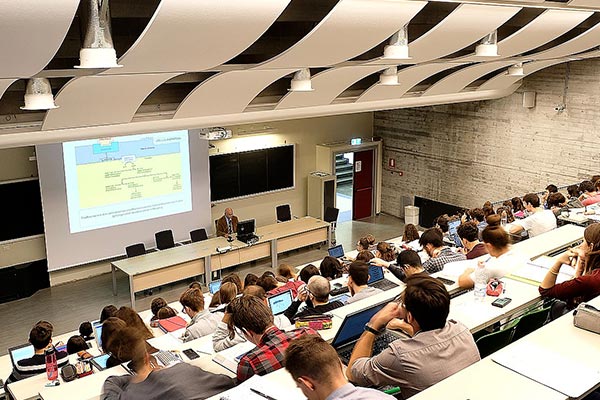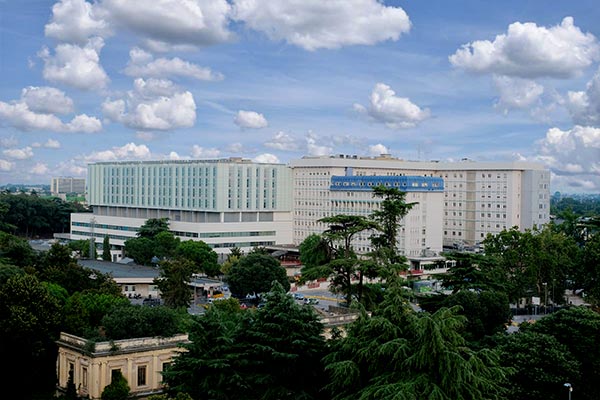|
Master's Degree in in Computer Engineering for Intelligent Systems
Course partially running
|
Advanced control systems (2025/2026)
|
6
|

|
6
|
|
|
Master's Degree in Computer Engineering for Intelligent Systems
|
Dynamic Systems (2025/2026)
|
6
|

|
6
|
|
|
Combined Bachelor's + Master's degree in Technological medicine and surgery
|
Genetics (2025/2026)
|
6
|

|
1
|
TIROCINIO DI RICERCA [Laboratorio ALTAIR - Gruppo Prof. Muradore]
|
|
Bachelor's degree in Computer Engineering for Robotic and Intelligent Systems
|
Introduction to system and signal analysis with laboratory (2025/2026)
|
9
|

|
3
|
(Teoria)
|
|
Master's Degree in Computer Engineering for Intelligent Systems
|
Robotics, vision and AI (2025/2026)
|
6
|

|
3
|
(ROBOTICS)
|
|
Master's degree in Computer Engineering for Robotics and Smart Industry
Course partially running
|
Advanced control systems (2024/2025)
|
6
|

|
6
|
|
|
Master's Degree in in Computer Engineering for Intelligent Systems
Course partially running
|
Dynamic Systems (2024/2025)
|
6
|

|
6
|
|
|
Bachelor's degree in Human Centered Medical System Engineering
Course partially running
|
Introduction to system and signal analysis with laboratory (2024/2025)
|
9
|

|
3
|
|
|
Master's Degree in in Computer Engineering for Intelligent Systems
Course partially running
|
Robotics, vision and AI (2024/2025)
|
6
|

|
3
|
(Robotics)
|
|
Master's degree in Computer Engineering for Robotics and Smart Industry
Course partially running
|
Advanced control systems (2023/2024)
|
6
|

|
6
|
|
|
Master's degree in Computer Engineering for Robotics and Smart Industry
Course partially running
|
Dynamic Systems (2023/2024)
|
9
|

|
9
|
|
|
Bachelor's degree in Human Centered Medical System Engineering
Course partially running
|
Introduction to system and signal analysis with laboratory (2023/2024)
|
9
|

|
3
|
|
|
Master's degree in Computer Engineering for Robotics and Smart Industry
Course partially running
|
Advanced control systems (2022/2023)
|
6
|

|
6
|
|
|
Bachelor's degree in Computer Science
Course partially running
|
Control theory (2022/2023)
|
6
|

|
3
|
|
|
Master's degree in Computer Engineering for Robotics and Smart Industry
Course partially running
|
Physical human-robot interaction (2022/2023)
|
6
|

|
5
|
|
|
Master's degree in Computer Engineering for Robotics and Smart Industry
Course partially running
|
Robotics, Vision and Control (2022/2023)
|
6
|

|
3
|
ROBOTICS
|
|
Master's degree in Computer Engineering for Robotics and Smart Industry
Course partially running
|
Advanced control systems (2021/2022)
|
6
|

|
6
|
|
|
Bachelor's degree in Computer Science
Course partially running
|
Control theory (2021/2022)
|
6
|

|
3
|
|
|
Master's degree in Computer Engineering for Robotics and Smart Industry
Course partially running
|
Physical human-robot interaction (2021/2022)
|
6
|

|
5
|
|
|
Master's degree in Computer Engineering for Robotics and Smart Industry
Course partially running
|
Robotics, vision and control (2021/2022)
|
6
|

|
2
|
ROBOTICS
|
|
Master's degree in Computer Engineering for Robotics and Smart Industry
Course partially running
|
Advanced control systems (2020/2021)
|
6
|

|
6
|
|
|
Bachelor's degree in Computer Science
Course partially running
|
Control theory (2020/2021)
|
6
|

|
3
|
|
|
Master's degree in Computer Engineering for Robotics and Smart Industry
Course partially running
|
Physical human-robot interaction (2020/2021)
|
6
|

|
5
|
(Teoria)
|
|
1
|
(Laboratorio)
|
|
Master's degree in Computer Engineering for Robotics and Smart Industry
Course partially running
|
Robotics, vision and control (2020/2021)
|
6
|

|
1
|
ROBOTICS (Laboratorio)
|
|
2
|
ROBOTICS (Teoria)
|
|
2
|
VISION AND CONTROL
|
|
Bachelor's degree in Computer Science
Course partially running
|
Control theory (2019/2020)
|
6
|

|
3
|
(Teoria)
|
|
Master's degree in Linguistics
Course partially running
|
Information Technology (2019/2020)
|
6
|

|
6
|
|
|
Master's degree in Computer Science and Engineering
Course partially running
|
Physical human-robot interaction (2019/2020)
|
6
|

|
3
|
(Laboratorio)
|
|
3
|
(Teoria)
|
|
Master's degree in Linguistics
Course partially running
|
Information Technology (2018/2019)
|
6
|

|
6
|
|
|
Master's degree in Computer Science and Engineering
Course partially running
|
Physical human-robot interaction (2018/2019)
|
6
|

|
3
|
(Teoria)
|
|
3
|
(Laboratorio)
|
|
Master's degree in Computer Science and Engineering
Course partially running
|
System theory (2018/2019)
|
12
|

|
4
|
SISTEMI DINAMICI
|
|
Master's degree in Computer Science and Engineering
Course partially running
|
Advanced Robotics (2017/2018)
|
6
|
|
6
|
|
|
Master's degree in Linguistics
Course partially running
|
Information technology (2017/2018)
|
6
|
|
6
|
|
|
Master's degree in Computer Science and Engineering
Course partially running
|
Advanced Robotics (2016/2017)
|
6
|
|
5
|
|
|
Bachelor's degree in Bioinformatics
Course partially running
|
System Architecture for Biotechnology (2016/2017)
|
6
|

|
1
|
|
|
Master's degree in Computer Science and Engineering
Course partially running
|
Advanced Robotics (2015/2016)
|
6
|
|
5
|
|
|
Master's degree in Computer Science and Engineering
Course partially running
|
Robotics (2014/2015)
|
6
|
|
6
|
|
|
Master's degree in Computer Science and Engineering
Course partially running
|
Robotics (2013/2014)
|
6
|
|
6
|
|
|
Master's degree in Computer Science and Engineering
Course partially running
|
Robotics (2012/2013)
|
6
|
|
6
|
|
|
Master's degree in Computer Science and Engineering
Course partially running
|
System theory (2009/2010)
|
12
|
|
4
|
TEORIA DEI SISTEMI
|








 muradore
muradore univr
univr

